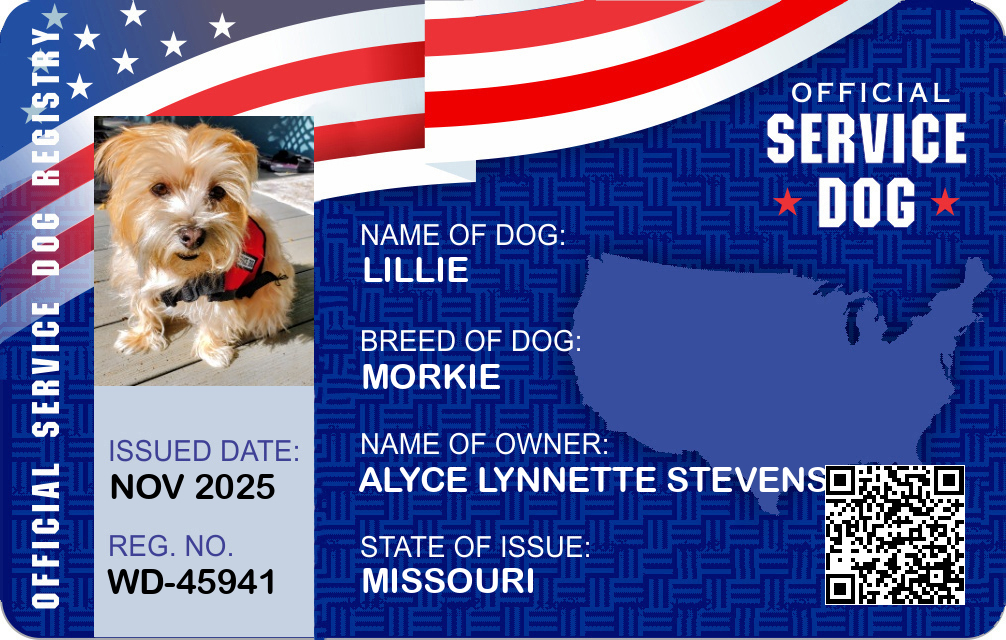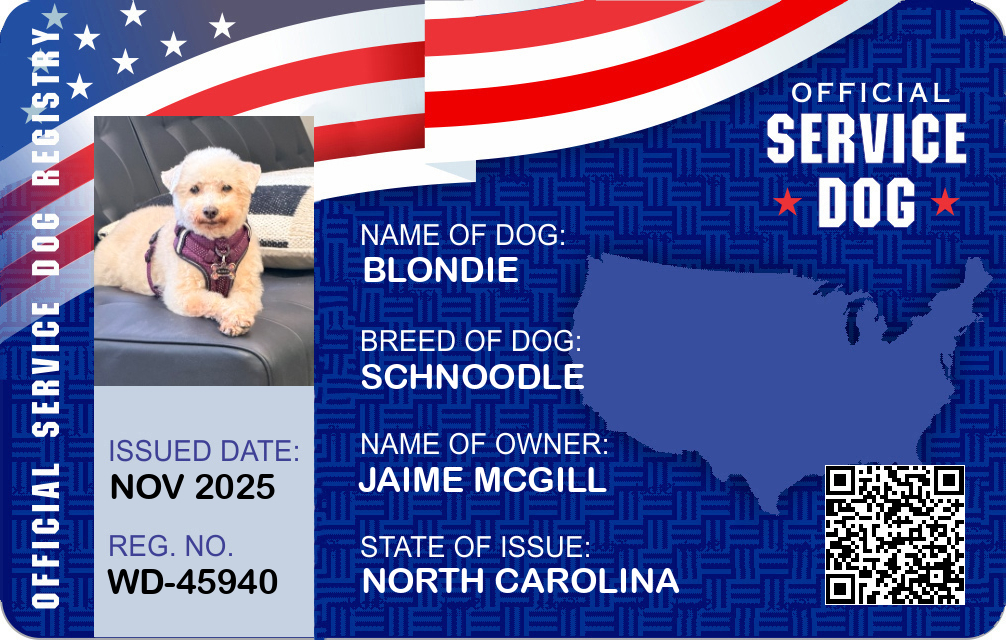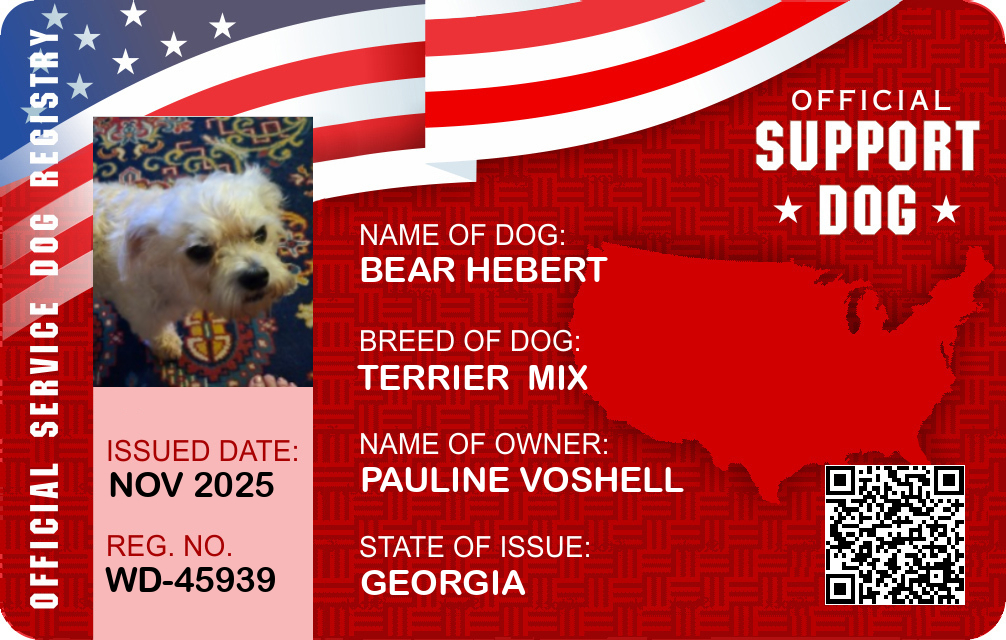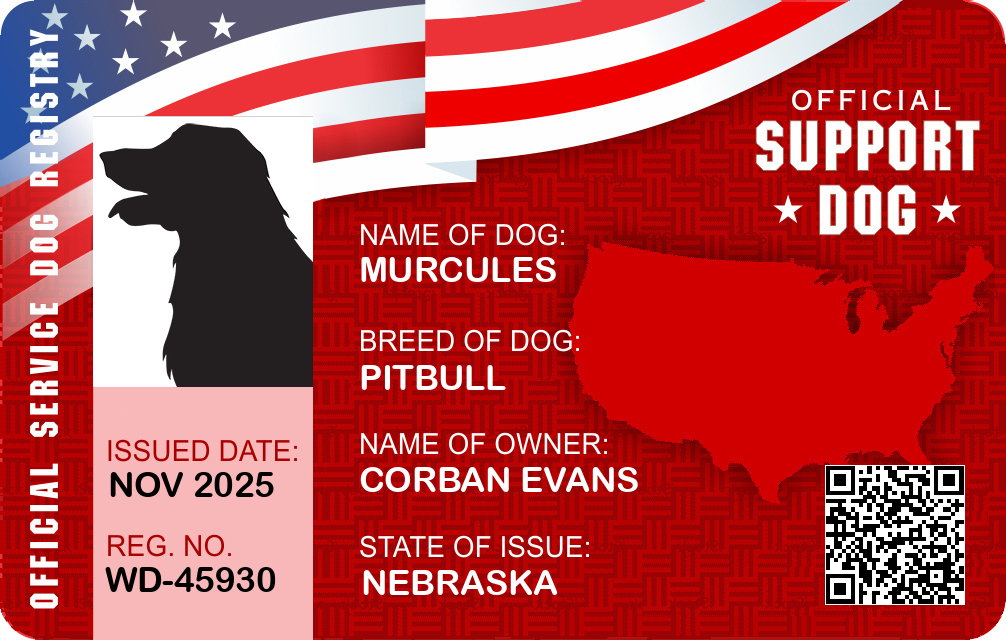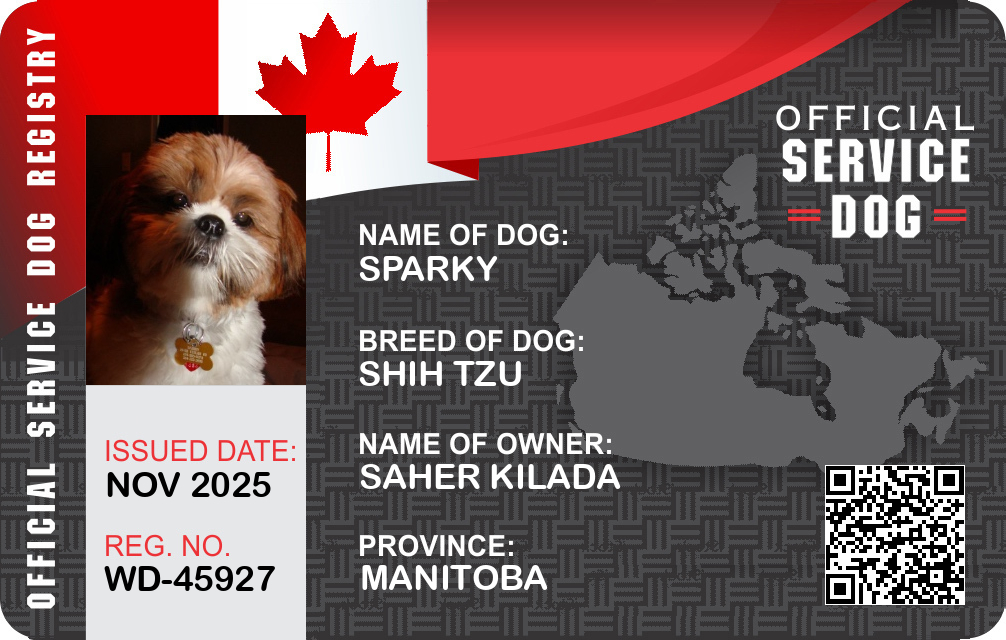Arkansas Service Dog Laws
Register Your Dog

Overview of Service Dog and Legal Definitions in Arkansas
What is a Service Dog?
A service dog is defined under the Americans with Disabilities Act (ADA) as a dog that has been individually trained to perform tasks or do work for a person with a disability. Disabilities can include physical, sensory, psychiatric, intellectual, or other mental disabilities. The dog’s work or tasks must be directly related to the person’s disability, such as guiding a person who is visually impaired, alerting a person with hearing loss, pulling a wheelchair, retrieving items, alerting to seizures, and more.
How Service Dogs Differ from Other Types of Assistance Animals
Service dogs are distinct from other forms of assistance animals such as emotional support animals (ESAs) and therapy animals. While service dogs are trained to perform specific tasks to assist people with disabilities, emotional support animals provide comfort just by being with a person. ESAs do not require specialized training, as their presence is meant to provide emotional relief to their owner. Therapy animals, on the other hand, are usually trained to provide comfort and affection to people in hospitals, retirement homes, schools, and other institutions but are not specifically trained to assist one person with a disability.
Key Federal Laws Affecting Service Dogs (e.g., ADA, FHA, ACAA)
Federal laws offer significant protections to service dog handlers.
- The Americans with Disabilities Act (ADA) ensures that service dogs are allowed to accompany their handlers in most public places and businesses. This law overrides any local ordinances or policies that might otherwise restrict the presence of animals.
- The Fair Housing Act (FHA) prohibits discrimination in housing against people with disabilities by requiring landlords to make reasonable accommodations for service animals and emotional support animals, even in properties with no-pet policies.
- The Air Carrier Access Act (ACAA) provides guidelines regarding the accommodation of service animals for air travel, ensuring they can accompany their handlers in the cabin of an aircraft.
State-Specific Service Dog Laws in Arkansas
Arkansas follows federal guidelines closely but also has state-specific laws that supplement these protections. The state recognizes service dogs and ensures their handlers have access to public accommodations and transportation, aligning with the ADA’s provisions. Arkansas law also stipulates that landlords must accommodate service animals in housing situations.
Housing Rights and Responsibilities
Service dog handlers in Arkansas have rights under both federal and state law. The Fair Housing Act (FHA) ensures that individuals with disabilities are not discriminated against in renting or purchasing housing. Landlords are required to make reasonable accommodations for service animals, even if the property has a no-pets policy. Importantly, landlords cannot charge additional fees or deposits for service animals, though handlers can be held responsible for any damage caused by the animal. Failure to comply with these requirements can lead to legal repercussions for landlords, including fines and penalties.
Public Access and Accommodation
In Arkansas, service dogs must be granted access to any place of public accommodation, consistent with the ADA. This includes restaurants, hotels, retail stores, schools, and hospitals. The state law reinforces this broad access, emphasizing the importance of ensuring that people with disabilities can engage in everyday activities without unnecessary barriers. Businesses are not allowed to ask about the person’s disability but are permitted to inquire if the animal is a service dog required because of a disability and what tasks the dog has been trained to perform.
Transportation and Travel Rules
Transportation systems in Arkansas, including buses, trains, and other public transit, are required to accommodate service dogs. The Air Carrier Access Act (ACAA) also mandates that service animals be allowed to accompany their handlers in airport terminals and aircraft cabins, with few exceptions. Handlers should consult with airlines well in advance to understand any specific requirements. Importantly, while service dogs are allowed on all forms of public transportation, airline policies may differ, particularly for routes outside the United States, so checking specific airline policies is highly recommended before traveling.
Employment and Workplace Considerations
The employment protections under the ADA ensure that individuals with disabilities have the right to work without discrimination, which includes the right to a reasonable accommodation for service animals in th
e workplace. Employers in Arkansas are required to make reasonable accommodations for employees who have service animals, even if the workplace has a general no-pets policy. Employers may not demand additional documentation from employees, beyond verifying that the service animal is needed due to a disability and that it is trained to perform tasks associated with that disability.Documentation, Requirements, and Processes in Arkansas
Service Dog Documentation and Who Can Issue It
According to the ADA, no special documentation is required to prove that a dog is a service animal. Handlers are not mandated to carry identification for their animals, and businesses are limited to asking the two permissible questions regarding the animal’s status as a service animal. However, for housing or employment, additional documentation may be requested only to establish the need for the service dog due to a disability, not the dog’s training. This documentation can typically be a letter from a healthcare provider.
Landlord, Business, and Provider Verification Rules
Landlords and businesses in Arkansas can ask for verification that a service dog is needed due to a disability but cannot demand detailed medical records or identification for the animal itself. They must make reasonable accommodations unless it can be demonstrated that doing so would cause undue hardship.
Rights, Limitations, and Legal Risks
Rights Service Dog Handlers Have in Arkansas
Handlers in Arkansas enjoy the right to be accompanied by their service dogs in all areas where the public is allowed to go, the ability to live with their service dogs even in housing that prohibits pets, and the right to work without discrimination due to having a service dog.
Limits on Service Dog Protections and Common Restrictions
While Arkansas law broadly supports service dog access, there are limitations. For example, if a service dog is not under control, or if the presence of a service dog poses a direct threat to the health or safety of others, businesses may legally ask that the animal be removed. This does not mean that the handler can be asked to leave, however, only the dog.
Penalties for Fraud or Misrepresentation
Fraudulently misrepresenting a pet as a service animal is illegal and carries potential penalties. If an individual is caught misrepresenting an animal as a service animal, they may face fines and other legal consequences, which are intended to protect the rights of individuals with legitimate service dogs.
Practical Guidance for Service Dog Handlers in Arkansas
How to Qualify for a Service Dog Legitimately
Individuals seeking to qualify for a service dog should begin by consulting with a healthcare or mental health professional to determine what tasks a service animal would need to perform to assist with the disability. Following this, working with a reputable service dog training organization or professional trainer to ensure the dog is properly trained is crucial.
How to Talk to Landlords, Airlines, and Employers
When communicating with landlords, airlines, or employers, handlers should be clear, honest, and prepared with any documentation that supports their need for a service dog, while understanding their rights regarding what these entities can and cannot request as evidence of the dog’s status as a service animal.
Summary of Service Dog Laws in Arkansas
In summary, service dog handlers in Arkansas are protected by a combination of state and federal laws that grant them broad rights to access public spaces, housing, transportation, and employment. However, these rights are balanced by responsibilities, such as ensuring that a service dog is properly trained and under control at all times. The legal landscape penalizes misrepresentation, ensuring that the integrity and purpose of service dogs are preserved.
Key Points for Service Dog Handlers in Arkansas:
- **Understand federal and state laws governing service dogs, focusing on ADA, FHA, and ACAA.
- Ensure your service dog is trained to perform specific tasks related to your disability.
- No specific documentation is required for public access, but housing and employment may request minimal verification.
- Communicate clearly with landlords, airlines, and employers, knowing your rights and what they can request.
- Be aware of limitations—service dogs must be under control and cannot pose a threat.
- Avoid misrepresentation—falsely claiming a pet as a service dog is illegal.**
Through this guide, service dog handlers can navigate the complexities of Arkansas’s legal framework effectively, helping ensure compliance and advocating for their rights in various scenarios.



